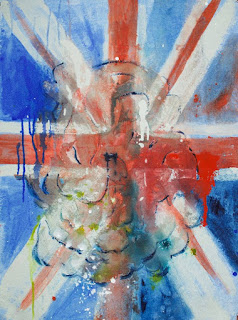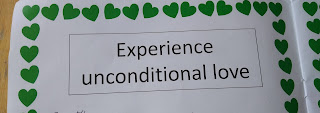Flag-elation
When Tom Hunt MP suggested that it should be 'compulsory' for all schools to fly the British flag, all I wanted was to avoid the trap that he clearly wanted teachers to fall into. The one where he gets to cast teachers off as a washy blob of unpatriotic liberals for not wanting to plaster our schools in massive Union Jacks. Why not call his bluff? All turn up at Tom Hunt’s office demanding multiple enormous flags for all schools, one for each office, a portrait of the Queen in every classroom and 12ft marble statue of Boris Johnson in every lobby? But no, best to retain a dignified silence on the matter. He won't get as much joy from his petty culture war if he's the only one playing. I think.
But my very first post on this Blog was about Belonging. So... could a sense of patriotism be a helpful thing? Would it not be good if our children were possessed with a reassuring sense of belonging to the nation of which they are a citizen? Well, perhaps. But there are different ways of achieving this, and some are better than others.
 |
| Lockdown 2 by Carol McDermott |
Flags are a quick shortcut to belonging. And like most shortcuts, it will probably get you there quicker, but you will arrive having not been through the work necessary to feel secure in your new position. Like the student who plagiarises essays, or the one who fills their CV with lies. Even if you appear to get away with it at first, in the long run you will be haunted by a fear of being found out, a nagging and persistent sense of insecurity.
But a connection with one’s country that is built instead on strong foundations, on a deep affinity for and affiliation with the myriad institutions and traditions that bring us together. Such a connection will surely be more meaningful than one which is foisted on a people from a government that is telling them what they should think about their country.
"There is hopeful symbolism in the fact that flags do not fly in a vacuum" (Arthur C. Clarke)
Furthermore, a population that is secure and confident in their patriotism will be happy to dive critically into the murky waters of its past. A country that feels insecure will be afraid to look too closely into such a history. Afraid of what will happen to the collective national identity when unpleasant truths emerge. They might even go so far as to commission an enquiry just to report that there is no need to critically address failings in our past. They will be afraid, because their version of national identity is built on the kind of shallow symbolism of jingoistic flag-waving that could topple in a strong wind. Afraid that if they don’t keep telling people to wave flags, the people might stop waving them all together. And then what?
I wasn’t able to find a list of which governments around the world insist on flying flags in schools. But after a cursory few minutes browsing some forums on the topic, these are some examples I’ve found.
Countries that seem to go big on flags in schools: America, Russia, Indonesia, Egypt, North Korea.
Countries that don’t: Canada, New Zealand, Finland, Netherlands, Germany.
From this hasty unscientific survey I am deducing the following: The more insecure a nation is with the concept of patriotic identity, the more loudly they will try and shout about it, as if they are trying desperately to project a conviction they don’t truly feel.
 |
| Out of the blue by Danijela Dan |
Schools are constantly trying to engender a sense of belonging to the unit, a shared ethos and identity. It is unsurprising that so many have responded to Hunt’s request by suggesting that they would rather fly their own ‘school’ flag as this is more meaningful to their students. Ofsted clearly prize shared values; it's mentioned a lot in their reports. I know of some schools who get students to demonstrate this by telling them repeatedly what these values are. But the deep connection with, and understanding of these values comes only when they are visible in deeds not words. And in the best schools that I’ve seen and worked in, the students feel a sense of belonging to the school even if - especially if - they are never explicitly told to feel such a thing. In other words, the drive to feel a proud sense of belonging to a group will be better if generated from within, rather than imposed from without.
Many Americans, with their flags in every school, knowing the words to their national anthem and reciting their pledge of allegiance every day, are surely very patriotic people. But 50% of them voted for Donald Trump. Patriotism can mean different things to different people at different times. I guess if you believe patriotism is about symbols, and gestures, then those are the patriots you will get.
So with that in mind I'll be saying no thanks to Tom Hunt MP's offer of a flagpole on my school, but I will refrain, for now, from offering him my suggestion as to where he can put it.



Comments
Post a Comment